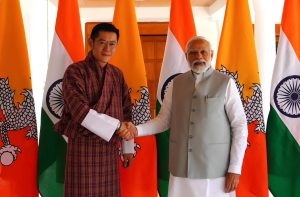Following its fourth parliamentary elections and the swearing in of a new government in January, those watching Asia’s geopolitical dynamics would be wise to turn their eyes to Bhutan, a tiny kingdom uncomfortably squeezed between the giants of China and India. How is this small state with limited strategic space and even fewer options to marshal agency balancing the competing interests of its two nuclear-armed great power rival neighbors?
To date, Bhutan does not have official diplomatic relations with China, while it maintains a “special relationship” with India. But the triangular relationship is not as simple as it might appear.
Bhutan shares a dilemma with most small states: How to achieve a favorable strategic geopolitical balancing act. It is not easy, but Bhutan has defied the traditionally accepted foreign policy wisdom that in such situations, a country would either balance or bandwagon. Nor has Thimphu resorted to pitching China and India against one another – a common temptation for smaller states. This nuanced approach arguably should be credited for the comparatively stable triangular relations between Bhutan-China-India in the critical Himalayan sphere.
With a narrow margin of error in Bhutan’s foreign policy posturing toward its powerful neighbors, Thimphu’s efforts to ensure predictable ties with China and India – and between them – are linked to its very survival. Thus, the country’s foreign policy pathways are navigated within the broader systemic constraints that the competitive and confrontational China-India relations pose.
Central to Bhutan’s bilateral and multilateral engagements is the driving force of China-India relations. They are not only powerful nations, but immediate neighbors whose state behaviors bear great implications for smaller nations on their periphery.
As China’s influence grows, Bhutan’s foreign policy perception has been changing. The idea of China as a South Asian geopolitical entity has become a reality; in that context, stable and normalized relations between Bhutan and China could improve Bhutan-China-India relations. China will get a clearer picture of Bhutan’s position in the triangle when Thimphu and Beijing can discuss issues directly.
It might be difficult for India to adapt to this changing dynamic, but such a change will serve its own security interest in the long run. A strong Bhutan with good relations with China will hugely reduce the strategic mistrust between China and India. Historically, practically, and geographically, the futures of Bhutan and India are intertwined. Given that Bhutan is on the southern Himalayas, its access to the world will always be easier through India. And Bhutan understands India more than any other country.
The biggest challenge facing Bhutan is to convince China and India that it will be sensitive to their security concerns, as it is difficult to balance their overlapping great power interests and ambitions. A distinguishing element in this challenge is India’s zealous approach to maintain Bhutan as its strategic backyard, while China thinks Bhutan must get out of India’s shadows and forge good relations with it as well.

































